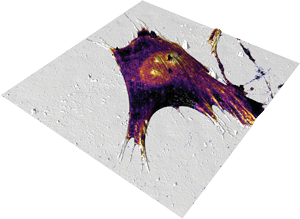AFM Systems
AFM Accessories
Learning
Contact Us

AFM's ability to directly interact with samples at the nanoscale and in near-physiological conditions enable novel insights into the structure and nanomechanical properties of living samples. AFM is especially useful in understanding the mechanical properties of the extracellular environment. However, quantitative measurements of these properties are often stymied by a number of experimental and instrumentational parameters.
Dr. Nicholas A. Geisse, Chief Science Officer at NanoSurface Biomedical Inc., will present an overview of AFM for mechanobiology and will discuss keys to successful implementation:

Dr. Nicholas A. Geisse, NanoSurface Biomedical, Seattle, WA
Dr. Geisse is Chief Science Officer of NanoSurface Biomedical, Seattle, WA. He has over 20 years of AFM experience in research and industry (Oxford Instruments Asylum Research), with numerous published papers in the field. He was a postdoctoral research Fellow in the Kevin Parker Lab at Harvard University. Dr. Geisse received his PhD from Cambridge University in Pharmacology.
Academic and industrial researchers including:
• Cell biologists, biophysicists, and scientists who are studying cellular cell function and to cell-substrate interactions, or geometrical and mechanical properties of the extracellular microenvironment in processes such as as cancer, cardiovascular disease, muscular dystrophy, and the control of cell life and death
• Scientists using AFM/SPM or other optical /fluorescence microscopy
• Managers and instructors of multi-user characterization, microscopy, or nanotechnology centers